
The Somali Armed Forces are the military forces of the Federal Republic of Somalia. Headed by the president as commander-in-chief, they are constitutionally mandated to ensure the nation's sovereignty, independence and territorial integrity.
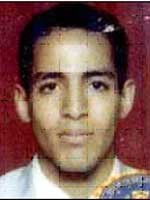
Saleh Ali Saleh Nabhan was the leader of al-Qaeda in Somalia. He was listed on the FBI's third major "wanted" list, the FBI Seeking Information – War on Terrorism list, for his association with multiple attacks in Kenya in 2002, as well as his possible involvement in the 1998 United States embassy bombings, in which over 250 people lost their lives.

The African Union Mission in Somalia (AMISOM) was a regional peacekeeping mission operated by the African Union with the approval of the United Nations Security Council. It was mandated to support transitional governmental structures, implement a national security plan, train the Somali security forces, and to assist in creating a secure environment for the delivery of humanitarian aid. As part of its duties, AMISOM supported the Federal Government of Somalia's forces in their battle against Al-Shabaab militants.

Operation Enduring Freedom – Horn of Africa (OEF-HOA) is a component of Operation Enduring Freedom (OEF). The Combined Joint Task Force – Horn of Africa (CJTF-HOA) is the primary military component assigned to accomplish the objectives of the mission. The naval components are the multinational Combined Task Force 150 (CTF-150) and Combined Task Force 151 (CTF-151) which operates under the direction of the United States Fifth Fleet. Both of these organizations have been historically part of United States Central Command. In February 2007, United States President George W. Bush announced the establishment of the United States Africa Command which took over all of the area of operations of CJTF-HOA in October 2008.

The timeline of events in the War in Somalia during 2007 is set out below.
Since the 1960s the United States Central Intelligence Agency (CIA) has engaged in a variety of covert activities in the east African country of Somalia. These activities have included financing pro-Western Somali political parties, funding warlords, extraordinary renditions and most recently operating black sites.

The 2009 timeline of events in the Somalia War (2006–2009) during January 2009 is set out below. From the beginning of February the timeline of events in the Somali Civil War (2009–present) is set out following the conclusion of the previous phase of the civil war.

The Somali civil war (2009–present) is the ongoing phase of the Somali civil war which is concentrated in southern and central Somalia. It began in late January 2009 with the present conflict mainly between the forces of the Federal Government of Somalia assisted by African Union peacekeeping troops and al-Shabaab militants who pledged alliegence to al-Qaeda during 2012.
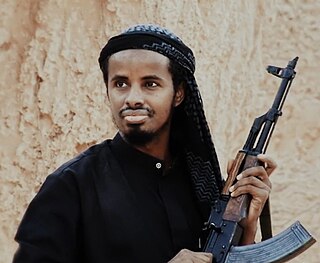
Ahmed Abdi Godane, also known as Mukhtar Abu Zubair, was the Emir (leader) of Al-Shabaab, an Islamist group based in Somalia. Godane, who received training and fought in Afghanistan, was designated by the United States as a terrorist. The exact date of Godane's rise to al-Shabaab's Emir is debated, although it seems he ascended to this position in December 2007.
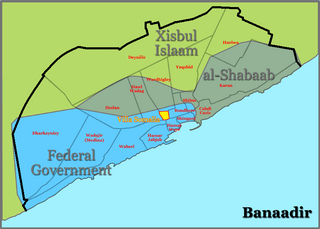
The Battle of Mogadishu (2010–11) began on 23 August 2010 when al-Shabaab insurgents began attacking government and African Union Mission to Somalia (AMISOM) positions in the Somali capital of Mogadishu. Al-Shabaab began its offensive after its spokesman said the group was declaring a "massive war" on troops sent by AMISOM, describing its 6,000 peacekeepers as "invaders". In December 2010 the number of AMISOM troops was increased to 8,000 and later to 9,000. The battle's name usually includes the years, when referenced, in order to distinguish it amongst the nine major Battles of Mogadishu during the decades long Somali Civil War.

This is a 2011 timeline of events in the Somali Civil War (2009–present).
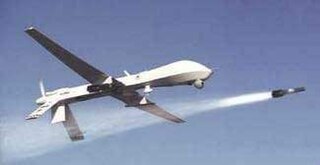
The Disposition Matrix, informally known as a kill list, is a database of information for tracking, capturing, rendering, or killing suspected enemies of the United States. Developed by the Obama administration beginning in 2010, it goes beyond existing kill lists and is intended to become a permanent fixture of U.S. policy. The process determining the criteria for killing is not public and was heavily shaped by National Counterterrorism Director and former Central Intelligence Agency (CIA) Director John O. Brennan.
This article contains a timeline of events for the Somali jihadist group al-Shabaab.

This is a 2013 timeline of events in the Somali Civil War (2009–present).

This is a 2010 timeline of events in the Somali Civil War (2009–present).

Abbas Abdullahi Sheikh Siraji was a Somali politician who briefly served as the Minister of Public Works and Reconstruction until he was shot dead in Mogadishu in 2017.

This is a 2016 timeline of events in the Somali Civil War (2009–present).
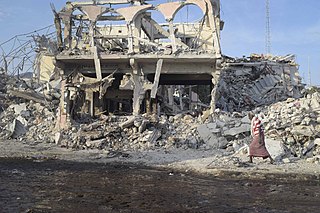
On 14 October 2017, two truck bombings took place in Mogadishu, the capital of Somalia, killing at least 587 people and injuring 316 others. Almost all of the casualties were caused by one of the trucks, which detonated when the driver, while attempting to escape from security officials, crashed through a barrier and exploded in the Hodan District, destroying a hotel. The intended target of the attack is believed to have been a secure compound housing international agencies and troops. The second blast happened close by, killing two people. A third explosives-laden truck was captured by police.
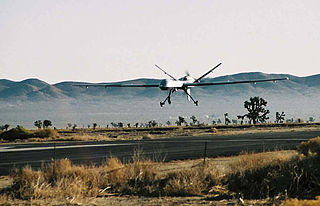
The United States has militarily supported the Transitional Federal Government and the Federal Government of Somalia in conflicts in Somalia since the early 2000's. U.S. military actions in Somalia date back to the 1980s, however following the September 11th attacks, military action was justified as counterterrorism. The Obama administration and the Trump administration conducted drone and fighter aircraft strikes, advisory missions, training, provided intelligence, and attacked al-Shabaab militants. Two U.S. special operations personnel, two contractors, one US Army soldier, and a CIA paramilitary officer have died during operations in Somalia.